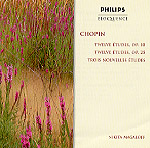In the main, Nikita Magaloff’s Chopin Etudes are solid, intelligent, and well-played regulation-model interpretations. No controversy (save for the use of a curious alternative text in the middle section of the E major Op. 10 No. 3 étude), no fuss, no muss, and just enough inflection to keep things from sounding mechanical and uninvolved. There’s not very much excitement or passion either. How can there be when certain selections seem worked up for the microphone, like the pianist’s cautious dispatches of all three A minor études, the Op. 10 C-sharp minor selection, and Op. 10 No. 7 with its cruelly exposed double notes? These 1975 recordings had the misfortune to appear the same year as Vladimir Ashkenazy’s excellent edition for Decca, which remains my reference version among modern stereo Chopin Études recordings (with Juana Zayas on Music and Arts first among the underrated and overlooked). If you want to sample Magaloff’s complete Philips Chopin cycle at its peak, wait for Eloquence to bring out the Polonaises, the Scherzos, and the Mazurkas.
































